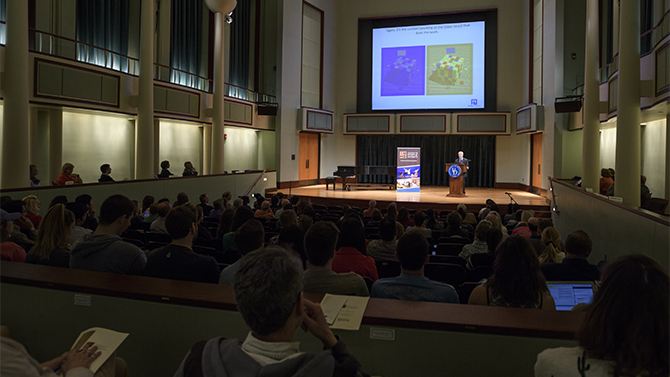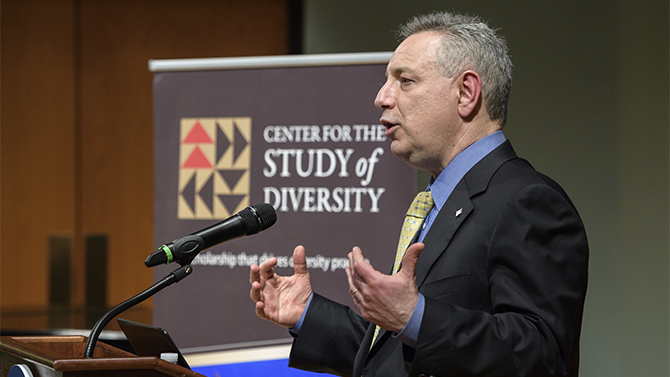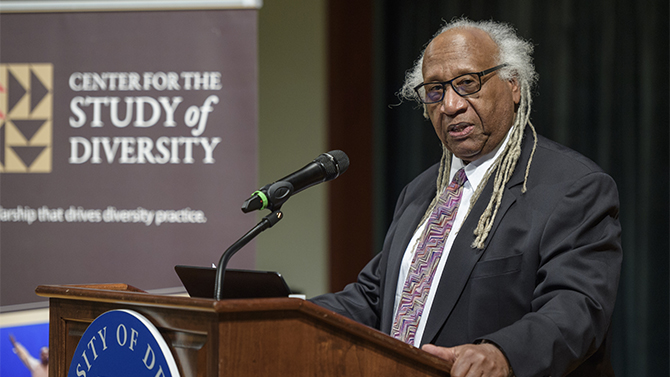

Of two minds
Photos by Kathy F. Atkinson April 12, 2017
Anthony Greenwald discusses effects of implicit bias
The concept of implicit bias — the idea that our minds operate on both a conscious, rational level and on an unconscious, intuitive level — is barely 20 years old but has already sparked a revolution in psychology, Anthony Greenwald told an audience at the University of Delaware on April 10.
Although the mind’s unconscious or implicit mode is known as its lower level, in many ways it’s in charge of our thinking whether we know it or not and whether we want to believe it or not, he said.
“The lower level controls conscious perception, thought and judgment,” Greenwald said. A professor of psychology at the University of Washington and co-author of the book Blindspot, he also is co-creator of the Implicit Association Test, an online tool that allows individuals to try out the concept for themselves.
To demonstrate some of the science behind the idea of implicit bias, Greenwald showed the audience visual and auditory illusions.
Two squares on a checkerboard, for example, appeared to be distinctly different shades of gray, but once they were moved onto a single plain background, the audience could see that the squares were actually identical. Placed back on the checkerboard, they again looked very different.
It’s all about context and the way context tricks the brain into seeing things in a certain way, Greenwald said. Most important, he said, once a person knows that the two squares are identical in the checkerboard illusion and tries to force his or her mind to see them that way, they still look different.
“Concentrated mental effort to prevent the conscious level from being governed by the automatic [unconscious] level does not help,” he told the audience.
In fact, he said, overcoming implicit associations — for example, associating negative words with older faces and positive words with younger ones — is extremely difficult. Such approaches as attending workshops and training sessions and resolving to be aware of implicit biases, while possibly somewhat helpful, have not been shown by evidence to reduce or eliminate such bias.
Greenwald noted that there are individual differences in the biases we have, but he also said the problem is “pervasive in the culture.” Good intentions, he added, are generally not enough.
“There are still important questions to be answered,” he said. “I think we’re about halfway through the ‘Implicit Revolution.’”
What can be done?
Greenwald noted that some remedies for implicit bias have worked in specific circumstances.
When musicians auditioning for an orchestra performed behind a screen so that they couldn’t be seen, the number of women accepted for employment increased significantly. And using detailed checklists in decision-making, as surgeons and pilots do in their work, can help reduce the intrusion of biases.
At universities seeking to overcome the effects of implicit bias, Greenwald offered some advice.
He urged faculty members to grade and evaluate student work without identifying personal information and to emphasize mentoring. He especially recommended looking for opportunities for “cross mentoring,” or working with students from a different demographic than the faculty member.
As for students, he encouraged them to “take the role of responsible bystander.”
“When you observe behavior that looks discriminatory, call it out,” he said.
Implicit Bias Awareness Week at UD
Greenwald’s lecture launched a week of events hosted by the College of Arts and Sciences’ Center for the Study of Diversity (CSD) and designed to raise awareness of implicit bias on campus.
The week has included numerous workshops for faculty and staff, employee development classes and student-focused events.
A closing event, “Continuing the Work,” will be held from 2-4 p.m., Thursday, April 13, in the Ewing Room of Perkins Student Center. The session, guided by Jennifer Daniels and Adam Foley of the Office of Equity and Inclusion, is free and open to the public and includes a reception with light refreshments.
To attend, RSVP here. Reception with light refreshments included.
In addition to the CSD, Greenwald’s lecture was sponsored by the Office of the President, Office of the Provost, College of Arts and Sciences and UD ADVANCE.
Contact Us
Have a UDaily story idea?
Contact us at ocm@udel.edu
Members of the press
Contact us at mediarelations@udel.edu or visit the Media Relations website





